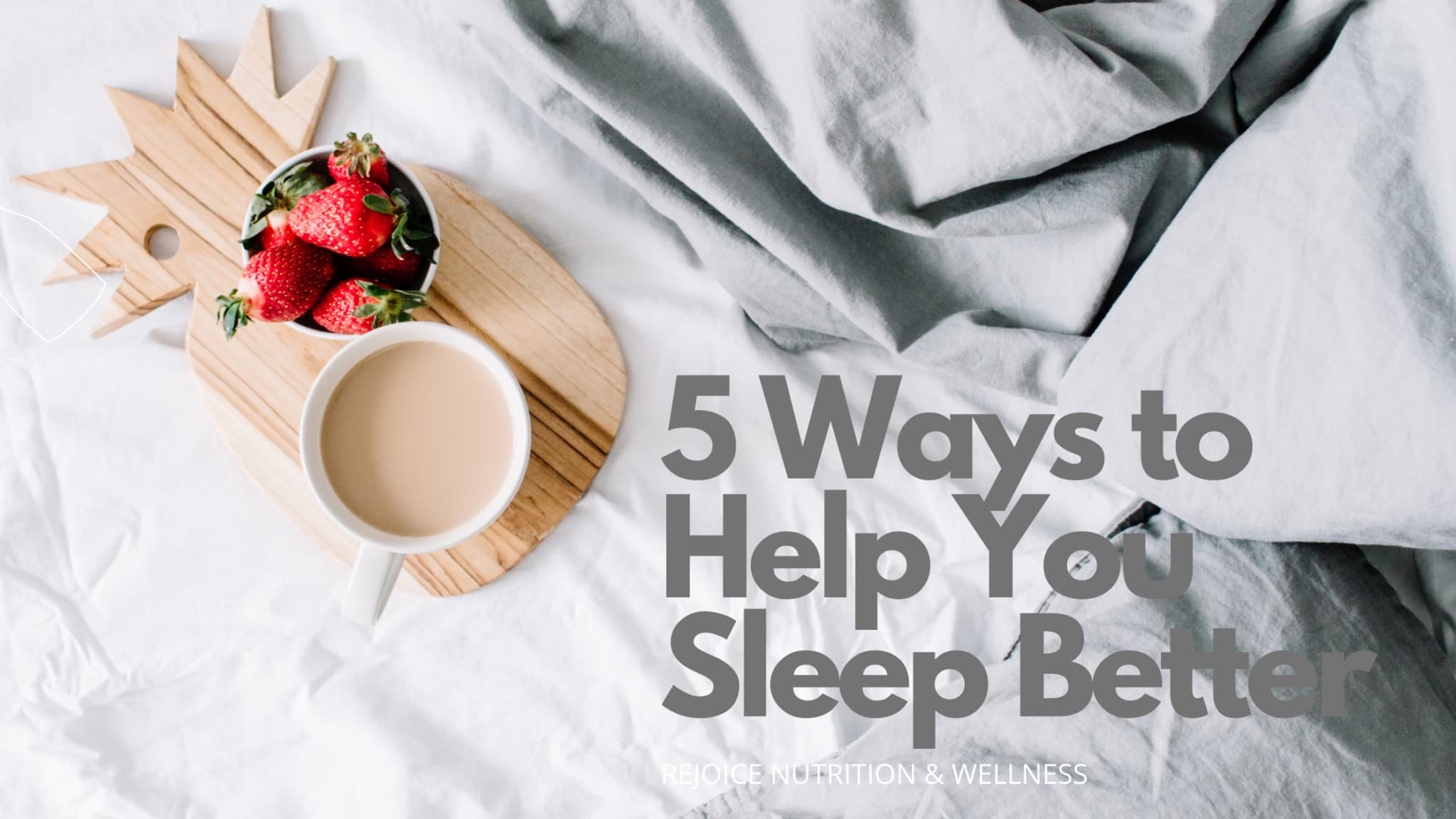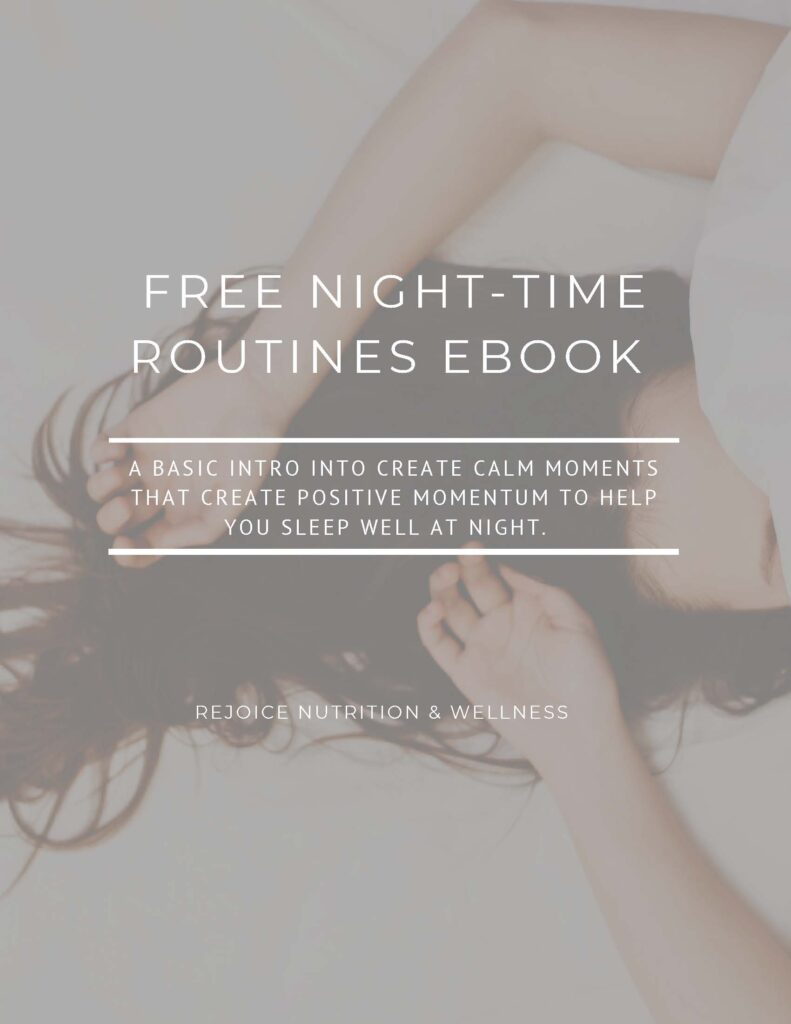Sleeping directly impacts your mental, emotional, and physical health. When we don’t get a full night’s sleep it can take a serious toll on your daytime energy, productivity, emotional balance, your metabolism, and your ability to handle stress.
Getting a good night’s sleep may seem like an impossible goal when you’re wide awake at 3 a.m., but you have much more control over the quality of your sleep than you probably realize. Just as the way you feel during your waking hours often hinges on how well you sleep at night, so the cure for sleep difficulties can often be found in your daily routine.

Unhealthy daytime habits and lifestyle choices can leave you tossing and turning at night and adversely affect your mood, brain and heart health, immune system, creativity, vitality, and weight. I have some simple healthy bedtime habits that can support you to achieve enjoy a night of better sleep, boost your health, and improve how you think and feel during the day.
5 Ways To Help You Sleep Better
1. Move to Sleep Better
People who exercise regularly sleep better at night and feel less sleepy during the day. Regular exercise also improves the symptoms of insomnia and sleep apnea and increases the amount of time you spend in the deep, restorative stages of sleep. Even light exercise—such as walking for just 10 minutes a day—improves sleep quality.

Exercise speeds up your metabolism, elevates body temperature, and stimulates hormones such as cortisol. This isn’t a problem if you’re exercising in the morning or afternoon, but too close to bedtime and it can interfere with sleep. Try to finish moderate to vigorous workouts at least three hours before bedtime. If you’re still experiencing sleep difficulties, move your workouts even earlier. Relaxing, low-impact exercises such as yoga or gentle stretching in the evening can help promote sleep.
2. Smart Night-Time Snacking for Sleep
For some people, a light snack before bed can help promote sleep. For others, eating before bed leads to indigestion and makes sleeping more difficult. If you need a bedtime snack, try:
- Half a turkey sandwich.
- A small bowl of whole-grain, low-sugar cereal.
- Milk or yogurt.
- A banana.
* Avoid caffeine, sugars, and refined simple carbs before bed which can trigger wakefulness at night and pull you out of the deep, restorative stages of sleep. Check out my 5 Guilt-Free Bedtime Snack Article here for more ideas

YOUR DAYTIME EATING HABITS PLAY A ROLE IN HOW WELL YOU SLEEP, ESPECIALLY IN THE HOURS BEFORE BEDTIME.
Limit caffeine and nicotine. You might be surprised to know that caffeine can cause sleep problems up to ten to twelve hours after drinking it! Similarly, smoking is another stimulant that can disrupt your sleep, especially if you smoke close to bedtime.
Avoid big meals at night. Try to make dinnertime earlier in the evening, and avoid heavy, rich foods within two hours of bed. Spicy or acidic foods can cause stomach trouble and heartburn.
Avoid alcohol before bed. While a nightcap may help you relax, it interferes with your sleep cycle once you’re out.
Avoid drinking too many liquids in the evening. Drinking lots of fluids may result in frequent bathroom trips throughout the night.
Cut back on sugary foods and refined carbs. Eating lots of sugar and refined carbs such as white bread, white rice, and pasta during the day can trigger wakefulness at night and pull you out of the deep, restorative stages of sleep.
3. Rock the Magnesium
Magnesium is known as the “anti-stress” mineral and acts like mother natures tranquilizer. Having some powdered magnesium like Natural Calm in a glass of water before bed can help. Magnesium is shown to support those that have anxiety-related insomnia as a way to relax and slow the body down. Magnesium regulates melatonin. The pineal gland, located in the middle of the brain, is responsible for secreting the melatonin hormone. This hormone is particularly involved with signaling your body to sleep and wake. When melatonin production is low, we experience disruptions in sleep schedules and patterns.

In their publication, ‘The Role of Cortisol in Sleep’, Bush and Hudson (2010) review the effects that cortisol has on sleep. According to the authors, some sleep problems could occur due to chronically elevated cortisol levels. However, proper nutrition supports adrenal glands and normal regulation of cortisol. This study identified magnesium as one of the nutrients needed in adequate amounts for cortisol feedback mechanisms. Magnesium helps to regulate the activities of adrenal glands by reducing the release of adrenaline and cortisol. This regulation can result in better sleep. So adding in foods high in magnesium in the evening like dark greens like spinach for dinner, and an evening snack such as a banana or piece of good quality dark chocolate is a great way to get it in
4. Control Your Exposure to Light
Melatonin is a naturally occurring hormone controlled by light exposure that helps regulate your sleep-wake cycle. Your brain secretes more melatonin when it’s dark—making you sleepy—and less when it’s light—making you more alert. However, many aspects of modern life can alter your body’s production of melatonin and shift your circadian rhythm. Here’s how to influence your exposure to light:
DAYTIME LIGHT
- Expose yourself to bright sunlight in the morning. The closer to the time you get up, the better. Have your coffee outside, for example, or eat breakfast by a sunny window. The light on your face will help you wake up
- Spend more time outside during daylight. Take your work breaks outside in sunlight, exercise outside, or walk your dog during the day instead of at night.
- Let as much natural light into your home or workspace as possible. Keep curtains and blinds open during the day, and try to move your desk closer to the window.
- If necessary, use a light therapy box. This simulates sunshine and can be especially useful during short winter days.

NIGHTTIME LIGHT
- Avoid bright screens within 1-2 hours of your bedtime. The blue light emitted by your phone, tablet, computer, or TV is especially disruptive. You can minimize the impact by using devices with smaller screens, turning the brightness down, or using light-altering software such as f.lux.
- Say no to late-night television. Not only does the light from a TV suppress melatonin, but many programs are stimulating rather than relaxing. Try listening to music or audiobooks instead.
- Don’t read with backlit devices. Tablets that are backlit are more disruptive than e-readers that don’t have their own light source.
- When it’s time to sleep, make sure the room is dark. Use heavy curtains or shades to block light from windows, or try a sleep mask. Also, consider covering up electronics that emit light.
- Keep the lights down if you get up during the night. If you need some light to move around safely, try installing a dim nightlight in the hall or bathroom or using a small flashlight. This will make it easier for you to fall back to sleep.
Night-Time Rituals For ZZZ’s

Establishing a bedtime routine or ritual can be hugely impactful to signal your brain and body to slow down. A hot cup of tea, blackout curtains, keeping free of social media an hour before bed that you might have an emotional response to, diffusing essential oils like lavender, or having a hot Epson salt bath can all be useful. Sometimes it can be overwhelming and you don’t know where to even begin?
I created a simple night-time ritual guide to give you some ideas to get started. Remember you do NOT need to follow anyone’s guide to create the perfect routine. Your routine should be as unique as you are! So try different strategies and you will quickly determine which you like and which really help you wind down for a great night’s sleep!
I hope these ideas support your body into a night of deep restorative sleep. I would love to hear from you! comment on which strategies you love.
In great health,
Jo



